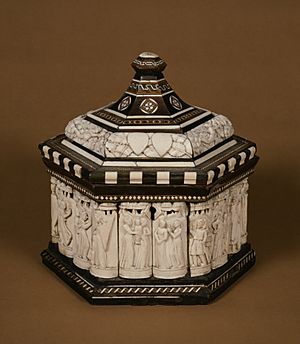Casket (decorative box) facts for kids
A casket is a special kind of decorative box or container. It's usually smaller than a big chest and often has beautiful designs.
Today, caskets are often used to keep jewelry safe. But long ago, people used them for many other things, like storing important papers. Many old caskets were also reliquaries, which means they held special religious items, like those from Buddhist or Christian faiths.
A tall, round casket is sometimes called a pyxis. This name comes from an old Greek pottery shape. Pyxis caskets were very popular in Islamic art, often made from a piece of an elephant's ivory tusk.
The word "casket" can sometimes sound like "strongbox." A strongbox is a very sturdy box, often made with lots of metal, used to store or move valuable things like coins. Strongboxes are more about being strong and useful than being pretty. Even though we think of caskets for jewelry now, in older times, valuable jewelry was often kept in a strongbox for safety.
History of Caskets
Many old caskets that still exist today are made from valuable materials, especially ivory, which is often placed around a wooden frame. In places like East Asia, caskets were often made from wood covered in lacquer, a shiny, protective coating.
A common type of casket in the Middle Ages was the house-shaped chasse. These were often used as reliquaries and were sometimes made with Limoges enamel, a type of colorful glasswork.
The Embriachi workshop in northern Italy was famous for making "marriage caskets." These were likely given to a bride-to-be by her new family. They were decorated with carved bone pictures and special wood patterns called certosina. These beautiful caskets were made around the 1400s. Later, in the 1400s, caskets decorated with pastiglia became popular. Pastiglia is a type of molded plaster or gesso that creates raised designs.
The famous Casket letters were a group of letters supposedly written by Mary, Queen of Scots. They were found in a casket belonging to her husband, Lord Bothwell. These letters were used by her enemies to suggest she was involved in the death of her previous husband, Lord Darnley. However, some people believe the letters might have been faked by her enemies.
A knottekistje is a special type of Dutch wedding casket, usually made of silver. The groom would give it to the bride, and it would contain coins. These silver caskets became popular in the 1600s, replacing cloth wrappers that were used before.
Famous Caskets
Some caskets from the late Roman Empire are still around today. The 4th-century Brescia Casket, the 8th-century Franks Casket, and the 10th-11th-century Veroli Casket are all made from beautifully carved ivory. Ivory was a very popular material for fancy boxes for a long time. Boxes that hold or once held relics (special religious items) are called reliquaries.
See also
 In Spanish: Joyero (mueble) para niños
In Spanish: Joyero (mueble) para niños
- List of caskets
- Coffin


